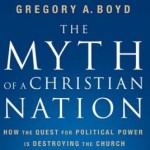We run our website the way we wished the whole internet worked: we provide high quality original content with no ads. We are funded solely by your direct support. Please consider supporting this project.
Podcast: Should Christians Seek Political Office?
Can a politician even be effective at politics if they are faithful disciples of Jesus?
Links:
Greg’s book: “The Myth of a Christian Nation“

Send Questions To:
Dan: @thatdankent
Email: askgregboyd@gmail.com
Twitter: @reKnewOrg
Greg’s new book: Inspired Imperfection
Dan’s new book: Confident Humility
Subscribe:
Category: ReKnew Podcast
Tags: Political Idolatry, Politics
Related Reading

Politics & the Kingdom of the World
Instead of aligning any version of the kingdom of this world with the kingdom of God—as is common in American Christianity—kingdom-of-God participants must retain a healthy suspicion toward every version of the kingdom of this world. This is especially necessary regarding one’s own version because that’s precisely where we’re most tempted to become idolatrous (see…

Election Benediction
On this election day, when so many Americans are experiencing high levels of anxiety, I thought it would be good to share an “Election Benediction” that was written and sent to me by Kenneth Tanner. Let it ground you in the love, peace and security of Christ and his Kingdom. An Election Benediction By Kenneth…

A Response to Tony Campolo on Fighting the Powers
While I have nothing but admiration for Tony Campolo, I differ with his views on how Christians are to be change agents in the world. He has always been a strong proponent of Christians bringing about change by political means. I, on the other hand, am not in principle opposed to Christians engaging in politics,…

12 Reasons for Keeping the Kingdom of God Separate from Politics, Part 2
Image by the justified sinner via Flickr Satan is the “god of this age” (2 Cor 4:4) and “ruler of the world (Jn 12:30; 14:31) who “controls the entire world” (1 Jn 5;19) and possesses all the power of “all the kingdoms of the world” (Lk 4:6). While governments are ordained by God to preserve…

Let’s Remember
In light of the events in the last few days involving attacks on American diplomats in foreign countries (and the ensuing political conflict), let’s remember one thing: Our fight is not with flesh and blood. As Christians, our real enemy is not Libyans or Egyptians or Muslims or President Obama or Governor Romney. Our enemy…

“I hope to challenge the assumption that finding the right political path has anything to do with advancing the kingdom of God.” [Quotes]
I do not argue that those political positions are either wrong or right. Nor do I argue that Christians shouldn’t be involved in politics. While people whose faith has been politicized may well interpret me along such lines, I assure you that this is not what I’m saying. The issue is far more fundamental than how we should vote or participate in government. Rather, I hope to challenge the assumption that finding the right political path has anything to do with advancing the kingdom of God.



